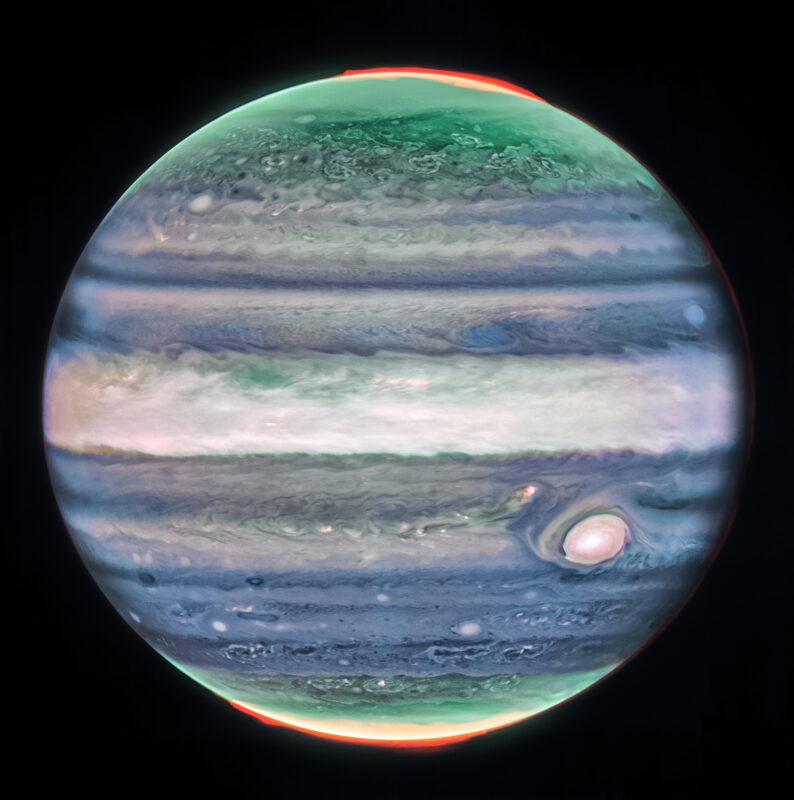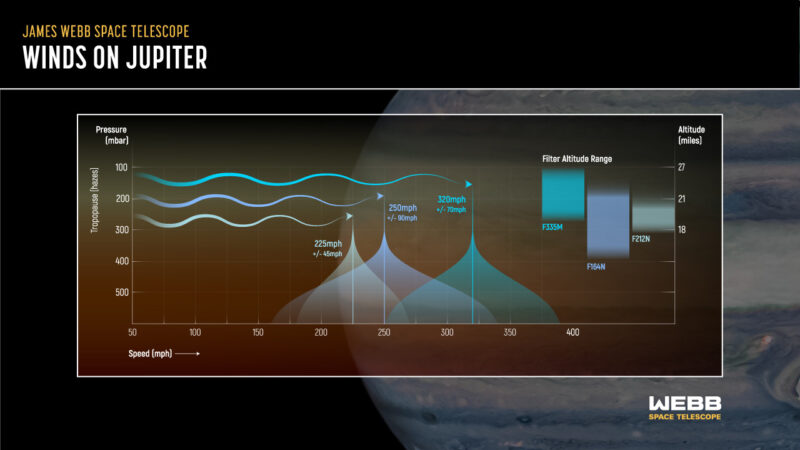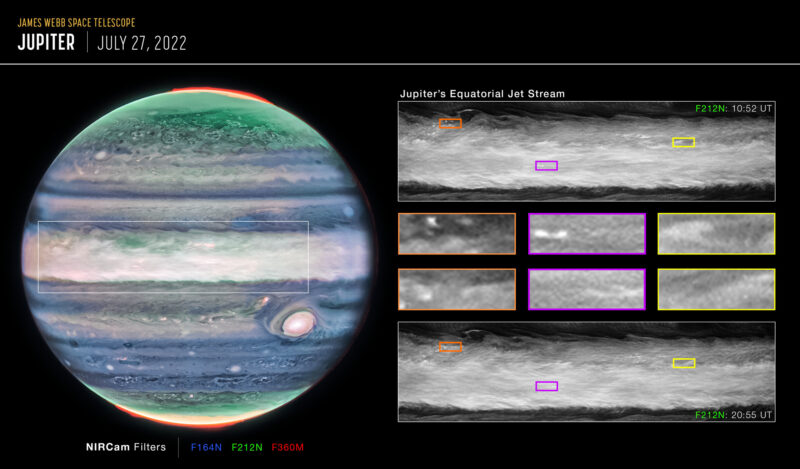
NASA published this original post at the Webb Space Telescope site on October 19, 2023. Edits by EarthSky.
Webb finds new feature in Jupiter’s atmosphere
NASA’s James Webb Space Telescope has discovered a new, never-before-seen feature in Jupiter’s atmosphere. The high-speed jet stream is more than 3,000 miles (4,800 km) wide, in contrast to just a few hundreds of miles wide, at most, for Earth’s jet streams. It sits over Jupiter’s equator, above the main cloud decks.
Ricardo Hueso of the University of the Basque Country in Bilbao, Spain, is the lead author on a new paper describing the findings. Hueso said:
This is something that totally surprised us. What we have always seen as blurred hazes in Jupiter’s atmosphere now appear as crisp features that we can track along with the planet’s fast rotation.
The scientists said this discovery of the jet gives them insights into how the layers of Jupiter’s famously turbulent atmosphere interact. The peer-reviewed journal Nature published their findings on October 19, 2023.
New data from Webb
The research team analyzed data that Webb’s Near-Infrared Camera (NIRCam) captured in 2022. The data came from the Early Release Science program, which Imke de Pater from the University of California, Berkeley, and Thierry Fouchet from the Observatory of Paris, jointly lead. The program takes images of Jupiter 10 hours apart. That’s the same as one Jupiter day. It uses four different filters, each uniquely able to detect small changes at different altitudes of Jupiter’s atmosphere.
De Pater said:
Even though various ground-based telescopes, spacecraft like NASA’s Juno and Cassini, and NASA’s Hubble Space Telescope have observed the Jovian system’s changing weather patterns, Webb has already provided new findings on Jupiter’s rings, satellites and its atmosphere.
A view of a higher layer in Jupiter’s atmosphere
Jupiter is different from Earth in many ways. Jupiter is a gas giant; Earth is a rocky, temperate world. But both planets have layered atmospheres. These other missions have observed in infrared, visible, radio and ultraviolet-light wavelengths. They could detect the lower, deeper layers of the planet’s atmosphere, where gigantic storms and ammonia ice clouds reside.
On the other hand, Webb’s farther-than-before look into the near-infrared is sensitive to higher-altitude layers of the atmosphere. These layers are around 15-30 miles (25-50 km) above Jupiter’s cloud tops. In near-infrared imaging, high-altitude hazes typically appear blurry, with enhanced brightness over the equatorial region. With Webb, finer details resolve within the bright, hazy band.
The newly discovered jet stream
The newly discovered jet stream travels at about 320 miles per hour (515 kph), twice the sustained winds of a Category 5 hurricane here on Earth. Its location is around 25 miles (40 km) above the clouds, in Jupiter’s lower stratosphere.
By comparing the winds Webb observed at high altitudes to the winds Hubble observed in deeper layers, the team could measure how fast the winds change with altitude and generate wind shears.

Webb and Hubble team up
Webb’s exquisite resolution and wavelength coverage allowed the detection of small cloud features used to track the jet. Meanwhile, complementary observations that Hubble took one day after were also crucial to determine the base state of Jupiter’s equatorial atmosphere and observe the development of convective storms (or thunderstorms) in Jupiter’s equator not connected to the jet.
Michael Wong of the University of California, Berkeley, who led the associated Hubble observations, said:
We knew the different wavelengths of Webb and Hubble would reveal the three-dimensional structure of storm clouds. But we were also able to use the timing of the data to see how rapidly storms develop.

What’s next?
The researchers are looking forward to additional observations of Jupiter with Webb to determine if the jet’s speed and altitude change over time. Team member Leigh Fletcher of the University of Leicester in the United Kingdom said:
Jupiter has a complicated but repeatable pattern of winds and temperatures in its equatorial stratosphere, high above the winds in the clouds and hazes measured at these wavelengths. If the strength of this new jet is connected to this oscillating stratospheric pattern, we might expect the jet to vary considerably over the next 2 to 4 years. It’ll be really exciting to test this theory in the years to come.
It’s amazing to me that, after years of tracking Jupiter’s clouds and winds from numerous observatories, we still have more to learn about Jupiter. And features like this jet can remain hidden from view until these new NIRCam images were taken in 2022.
Bottom line: The Webb space telescope revealed a jet stream in Jupiter’s atmosphere above its equatorial region.
Source: An intense narrow equatorial jet in Jupiter’s lower stratosphere observed by JWST
Read more: Jupiter racing toward opposition on November 2-3, 2023
The post Webb sees new feature in Jupiter’s atmosphere: a jet stream first appeared on EarthSky.
0 Commentaires